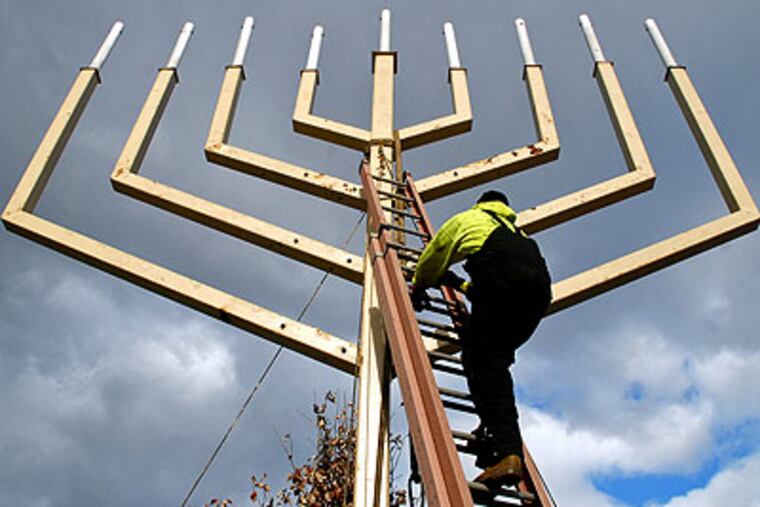Hanukkah with a climate-change message
The Jewish festival of lights begins at sundown tonight, and some say that to celebrate correctly this year, you might need a bicycle and a bottle of olive oil.

The Jewish festival of lights begins at sundown tonight, and some say that to celebrate correctly this year, you might need a bicycle and a bottle of olive oil.
That's because Hanukkah, which was a minor star on the celebratory horizon for generations, is being recast - again. And, just as at Hanukkah's 1879 reincarnation, Philadelphians are at ground zero of the shift.
Rabbi Arthur Waskow of the Shalom Center in West Mount Airy, who is among the change-seekers, reminds all who will listen that the Hanukkah story is about one day's supply of oil lasting eight days.
"Can there be a more perfect occasion to focus on energy conservation and breaking our dependence on fossil fuel?" the rabbi asks.
But even he was not aware that 130 years ago a group of young Jewish leaders from Philadelphia and New York was part of a nationwide movement to save Hanukkah from the shadow of an increasingly secular Christmas.
Jonathan D. Sarna, chief historian for the National Museum of American Jewish History and author of American Judaism, notes that Christmas became a national holiday in 1870. Recasting Hanukkah as a fun winter festival made sense then, Sarna says, just as emphasizing conservation does now.
Waskow is hoping multitudes of Jews and environmentalists will show up for a climate-change vigil at Independence Mall at 6:15 tomorrow night.
With the flick of a switch, "candles" will be lit on an electric menorah there, and, Waskow says, a big turnout will send a pointed message to world leaders meeting in Copenhagen, Denmark.
Meanwhile, hipsters in Northern Liberties have their own nine-foot, solar-powered menorah in Liberty Lands Park at Third and Poplar Streets, courtesy of the Jewish Center of Northern Liberties.
Elsewhere in the loosely organized Jewish Renewal movement nationwide, efforts are under way to get 600,000 signatures on a Jewish Climate Change Pledge (2,272 and counting at jewishclimatecampaign.org).
Waskow says everyone can do something to achieve the miracle of energy conservation. Such as?
Give up your car for a day (that's where the bike comes in). Switch to wind power at home and suggest an energy audit at your place of work or worship. Urge legislation to reduce subsidies for highways and increase them for mass transit. Light your menorah with beeswax candles, which do not contain the petroleum by-products of paraffin candles, or use good-old olive oil, the apparent choice of the ancients.
All this for a B-list holiday?
Historically, Hanukkah marks events of 165 B.C. The ruling Hellenistic empire imposed restrictions on Jewish worship to force assimilation, and ransacked the Jewish Temple in Jerusalem, extinguishing the eternal flame.
The Maccabees, a band of Jewish guerrilla fighters, fought back and secured the temple, but found only enough oil there to keep the flame lit for one day. Yet the light burned for eight days, long enough to make more oil.
Thus, a minor holiday was born.
Really minor - beneath not only Yom Kippur and Passover, but less significant by some accounts than the harvest festival of Sukkot, which hardly registers with most Christians.
Hanukkah might have remained a tier-two occasion if not for that group of young Jewish leaders in 1879, Sarna says. Its members saw themselves as fighting the same uphill battle against assimilation the Maccabees had taken on centuries earlier.
So on a Tuesday night in December, they rented the Academy of Music in New York for a festival aimed at making Hanukkah meaningful and fun for young adults.
Meanwhile, in Cincinnati, Rabbi Max Lilienthal was doing the same for children, says Dianne Ashton of Rowan University, who is writing a history of Hanukkah.
Lilienthal saw that most churches had Christmas festivals for children, "keeping them in happy expectation for their religion."
Aiming for "a Hanukkah as grand and glorious as any Christmas," Lilienthal organized a celebration in his congregation and encouraged others to do the same.
History bears witness to the success of those efforts.
Hanukkah is now a household word. Larger-than-life menorahs stand at Independence Hall, at the White House, and in major suburban shopping malls. Even Jews who ignore more important holidays eat latkes. And children enjoy eight days of gift-getting, even if some of those packages contain socks.
While interfaith marriage still looms large as a challenge to American Jewry, Waskow says, the time is right for this next shift. The idea, he says, is to add energy conservation to Hanukkah's message without detracting from the antiassimilation tract.
"Religion in the U.S. always reflects cultural changes," says Ashton. "So this is completely appropriate as far as I can tell. I'm not surprised."